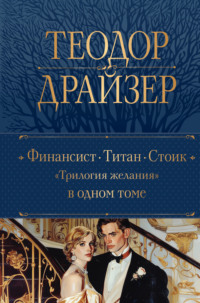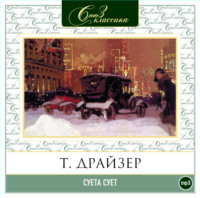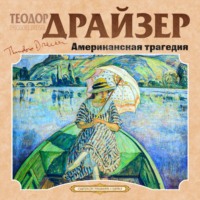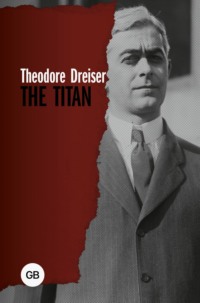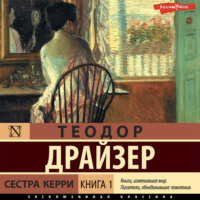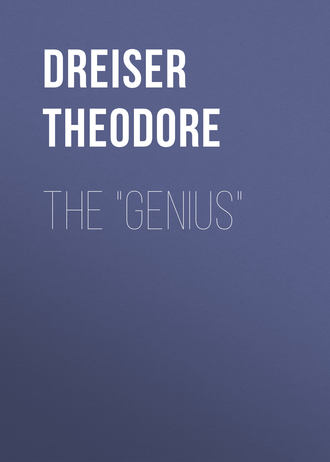 полная версия
полная версияThe "Genius"
"You know that string of coral beads I have, Angel Face," she asked Angela one morning some ten days before Eugene arrived. "Wear them with that tan linen dress of mine and your tan shoes some day for Eugene. You'll look stunning in those things and he'll like you. Why don't you take the new buggy and drive over to Blackwood to meet him? That's it. You must meet him."
"Oh, I don't think I want to, Babyette," she replied. She was afraid of this first impression. She did not want to appear to run after him. Babyette was a nickname which had been applied to Marietta in childhood and had never been dropped.
"Oh, pshaw, Angel Face, don't be so backward! You're the shyest thing I know. Why that's nothing. He'll like you all the better for treating him just a little smartly. You do that now, will you?"
"I can't," replied Angela. "I can't do it that way. Let him come over here first; then I'll drive him over some afternoon."
"Oh, Angel Face! Well, anyhow, when he comes you must wear that little rose flowered house dress and put a wreath of green leaves in your hair."
"Oh, I won't do anything of the sort, Babyette," exclaimed Angela.
"Yes, you will," replied her sister. "Now you just have to do what I tell you for once. That dress looks beautiful on you and the wreath will make it perfect."
"It isn't the dress. I know that's nice. It's the wreath."
Marietta was incensed by this bit of pointless reserve.
"Oh, Angela," she exclaimed, "don't be so silly. You're older than I am, but I know more about men in a minute than you'll ever know. Don't you want him to like you? You'll have to be more daring – goodness! Lots of girls would go a lot farther than that."
She caught her sister about the waist and looked into her eyes. "Now you've got to wear it," she added finally, and Angela understood that Marietta wanted her to entice Eugene by any means in her power to make him declare himself finally and set a definite date or take her back to New York with him.
There were other conversations in which a trip to the lake was suggested, games of tennis, with Angela wearing her white tennis suit and shoes, a country dance which might be got up – there were rumors of one to be given in the new barn of a farmer some seven miles away. Marietta was determined that Angela should appear youthful, gay, active, just the things which she knew instinctively would fascinate Eugene.
Finally Eugene came. He arrived at Blackwood at noon. Despite her objections Angela met him, dressed smartly and, as urged by Marietta, carrying herself with an air. She hoped to impress Eugene with a sense of independence, but when she saw him stepping down from the train in belted corduroy travelling suit with a grey English travelling cap, carrying a green leather bag of the latest design, her heart misgave her. He was so worldly now, so experienced. You could see by his manner that this country place meant little or nothing to him. He had tasted of the world at large.
Angela had stayed in her buggy at the end of the depot platform and she soon caught Eugene's eye and waved to him. He came briskly forward.
"Why, sweet," he exclaimed, "here you are. How nice you look!" He jumped up beside her, surveying her critically and she could feel his examining glance. After the first pleasant impression he sensed the difference between his new world and hers and was a little depressed by it. She was a little older, no doubt of that. You cannot hope and yearn and worry for three years and not show it. And yet she was fine and tender and sympathetic and emotional. He felt all this. It hurt him a little for her sake and his too.
"Well, how have you been?" he asked. They were in the confines of the village and no demonstration could be made. Until the quiet of a country road could be reached all had to be formal.
"Oh, just the same, Eugene, longing to see you."
She looked into his eyes and he felt the impact of that emotional force which governed her when she was near him. There was something in the chemistry of her being which roused to blazing the ordinarily dormant forces of his sympathies. She tried to conceal her real feeling – to pretend gaiety and enthusiasm, but her eyes betrayed her. Something roused in him now at her look – a combined sense of emotion and desire.
"It's so fine to be out in the country again," he said, pressing her hand, for he was letting her drive. "After the city, to see you and the green fields!" He looked about at the little one-storey cottages, each with a small plot of grass, a few trees, a neat confining fence. After New York and Chicago, a village like this was quaint.
"Do you love me just as much as ever?"
She nodded her head. They reached a strip of yellow road, he asking after her father, her mother, her brothers and sisters, and when he saw that they were unobserved he slipped his arm about her and drew her head to him.
"Now we can," he said.
She felt the force of his desire but she missed that note of adoration which had seemed to characterize his first lovemaking. How true it was he had changed! He must have. The city had made her seem less significant. It hurt her to think that life should treat her so. But perhaps she could win him back – could hold him anyhow.
They drove over toward Okoonee, a little crossroads settlement, near a small lake of the same name, a place which was close to the Blue house, and which the Blue's were wont to speak of as "home." On the way Eugene learned that her youngest brother David was a cadet at West Point now and doing splendidly. Samuel had become western freight agent of the Great Northern and was on the way to desirable promotion. Benjamin had completed his law studies and was practising in Racine. He was interested in politics and was going to run for the state legislature. Marietta was still the gay carefree girl she had always been, not at all inclined to choose yet among her many anxious suitors. Eugene thought of her letter to him – wondered if she would look her thoughts into his eyes when he saw her.
"Oh, Marietta," Angela replied when Eugene asked after her, "she's just as dangerous as ever. She makes all the men make love to her."
Eugene smiled. Marietta was always a pleasing thought to him. He wished for the moment that it was Marietta instead of Angela that he was coming to see.
She was as shrewd as she was kind in this instance. Her appearance on meeting Eugene was purposely indifferent and her attitude anything but coaxing and gay. At the same time she suffered a genuine pang of feeling, for Eugene appealed to her. If it were anybody but Angela, she thought, how she would dress and how quickly she would be coquetting with him. Then his love would be won by her and she felt that she could hold it. She had great confidence in her ability to keep any man, and Eugene was a man she would have delighted to hold. As it was she kept out of his way, took sly glances at him here and there, wondered if Angela would truly win him. She was so anxious for Angela's sake. Never, never, she told herself, would she cross her sister's path.
At the Blue homestead he was received as cordially as before. After an hour it quite brought back the feeling of three years before. These open fields, this old house and its lovely lawn, all served to awaken the most poignant sensations. One of Marietta's beaux, over from Waukesha, appeared after Eugene had greeted Mrs. Blue and Marietta, and the latter persuaded him to play a game of tennis with Angela. She invited Eugene to make it a four with her, but not knowing how he refused.
Angela changed to her tennis suit and Eugene opened his eyes to her charms. She was very attractive on the court, quick, flushed, laughing. And when she laughed she had a charming way of showing her even, small, white teeth. She quite awakened a feeling of interest – she looked so dainty and frail. When he saw her afterward in the dark, quiet parlor, he gathered her to his heart with much of the old ardour. She felt the quick change of feeling. Marietta was right. Eugene loved gaiety and color. Although on the way home she had despaired this was much more promising.
Eugene rarely entered on anything half heartedly. If interested at all he was greatly interested. He could so yield himself to the glamour of a situation as to come finally to believe that he was something which he was not. Thus, now he was beginning to accept this situation as Angela and Marietta wished he should, and to see her in somewhat the old light. He overlooked things which in his New York studio, surrounded by the influences which there modified his judgment, he would have seen. Angela was not young enough for him. She was not liberal in her views. She was charming, no doubt of that, but he could not bring her to an understanding of his casual acceptance of life. She knew nothing of his real disposition and he did not tell her. He played the part of a seemingly single-minded Romeo, and as such he was from a woman's point of view beautiful to contemplate. In his own mind he was coming to see that he was fickle but he still did not want to admit it to himself.
There was a night of stars after an evening of June perfection. At five old Jotham came in from the fields, as dignified and patriarchal as ever. He greeted Eugene with a hearty handshake, for he admired him. "I see some of your work now and then," he said, "in these monthly magazines. It's fine. There's a young minister down here near the lake that's very anxious to meet you. He likes to get hold of anything you do, and I always send the books down as soon as Angela gets through with them."
He used the words books and magazines interchangeably, and spoke as though they were not much more important to him than the leaves of the trees, as indeed, they were not. To a mind used to contemplating the succession of crops and seasons, all life with its multitudinous interplay of shapes and forms seemed passing shadows. Even men were like leaves that fall.
Eugene was drawn to old Jotham as a filing to a magnet. His was just the type of mind that appealed to him, and Angela gained by the radiated glory of her father. If he was so wonderful she must be something above the average of womanhood. Such a man could not help but produce exceptional children.
Left alone together it was hardly possible for Angela and Eugene not to renew the old relationship on the old basis. Having gone as far as he had the first time it was natural that he should wish to go as far again and further. After dinner, when she turned to him from her room, arrayed in a soft evening dress of clinging texture – somewhat low in the neck by request of Marietta, who had helped her to dress – Eugene was conscious of her emotional perturbation. He himself was distraught, for he did not know what he would do – how far he would dare to trust himself. He was always troubled when dealing with his physical passion, for it was a raging lion at times. It seemed to overcome him quite as a drug might or a soporific fume. He would mentally resolve to control himself, but unless he instantly fled there was no hope, and he did not seem able to run away. He would linger and parley, and in a few moments it was master and he was following its behest blindly, desperately, to the point almost of exposure and destruction.
Tonight when Angela came back he was cogitating, wondering what it might mean. Should he? Would he marry her? Could he escape? They sat down to talk, but presently he drew her to him. It was the old story – moment after moment of increasing feeling. Presently she, from the excess of longing and waiting was lost to all sense of consideration. And he —
"I shall have to go away, Eugene," she pleaded, when he carried her recklessly into his room, "if anything happens. I cannot stay here."
"Don't talk," he said. "You can come to me."
"You mean it, Eugene, surely?" she begged.
"As sure as I'm holding you here," he replied.
At midnight Angela lifted frightened, wondering, doubting eyes, feeling herself the most depraved creature. Two pictures were in her mind alternately and with pendulum-like reiteration. One was a composite of a marriage altar and a charming New York studio with friends coming in to see them much as he had often described to her. The other was of the still blue waters of Okoonee with herself lying there pale and still. Yes, she would die if he did not marry her now. Life would not be worth while. She would not force him. She would slip out some night when it was too late and all hope had been abandoned – when exposure was near – and the next day they would find her.
Little Marietta how she would cry. And old Jotham – she could see him, but he would never be really sure of the truth. And her mother. "Oh God in heaven," she thought, "how hard life is! How terrible it can be."
CHAPTER XXVII
The atmosphere of the house after this night seemed charged with reproach to Eugene, although it took on no semblance of reality in either look or word. When he awoke in the morning and looked through the half closed shutters to the green world outside he felt a sense of freshness and of shame. It was cruel to come into such a home as this and do a thing as mean as he had done. After all, philosophy or no philosophy, didn't a fine old citizen like Jotham, honest, upright, genuine in his moral point of view and his observance of the golden rule, didn't he deserve better from a man whom he so sincerely admired? Jotham had been so nice to him. Their conversations together were so kindly and sympathetic. Eugene felt that Jotham believed him to be an honest man. He knew he had that appearance. He was frank, genial, considerate, not willing to condemn anyone – but this sex question – that was where he was weak. And was not the whole world keyed to that? Did not the decencies and the sanities of life depend on right moral conduct? Was not the world dependent on how the homes were run? How could anyone be good if his mother and father had not been good before him? How could the children of the world expect to be anything if people rushed here and there holding illicit relations? Take his sister Myrtle, now – would he have wanted her rifled in this manner? In the face of this question he was not ready to say exactly what he wanted or was willing to countenance. Myrtle was a free agent, as was every other girl. She could do as she pleased. It might not please him exactly but – he went round and round from one problem to another, trying to untie this Gordian knot. One thing, this home had appeared sweet and clean when he came into it; now it was just a little tarnished, and by him! Or was it? His mind was always asking this question. There was nothing that he was actually accepting as true any more. He was going round in a ring asking questions of this proposition and that. Are you true? And are you true? And are you true? And all the while he was apparently not getting anywhere. It puzzled him, this life. Sometimes it shamed him. This deed shamed him. And he asked himself whether he was wrong to be ashamed or not. Perhaps he was just foolish. Was not life made for living, not worrying? He had not created his passions and desires.
He threw open the shutters and there was the bright day. Everything was so green outside, the flowers in bloom, the trees casting a cool, lovely shade, the birds twittering. Bees were humming. He could smell the lilacs. "Dear God," he exclaimed, throwing his arms above his head, "How lovely life is! How beautiful! Oh!" He drew in a deep breath of the flower and privet laden air. If only he could live always like this – for ever and ever.
When he had sponged himself with cold water and dressed, putting on a soft negligée shirt with turn-down collar and dark flowing tie, he issued forth clean and fresh. Angela was there to greet him. Her face was pale but she looked intensely sweet because of her sadness.
"There, there," he said, touching her chin, "less of that now!"
"I told them that I had a headache," she said. "So I have. Do you understand?"
"I understand your headache," he laughed. "But everything is all right – very much all right. Isn't this a lovely day!"
"Beautiful," replied Angela sadly.
"Cheer up," he insisted. "Don't worry. Everything is coming out fine." He walked to the window and stared out.
"I'll have your breakfast ready in a minute," she said, and, pressing his hand, left him.
Eugene went out to the hammock. He was so deliciously contented and joyous now that he saw the green world about him, that he felt that everything was all right again. The vigorous blooming forces of nature everywhere present belied the sense of evil and decay to which mortality is so readily subject. He felt that everything was justified in youth and love, particularly where mutual affection reigned. Why should he not take Angela? Why should they not be together? He went in to breakfast at her call, eating comfortably of the things she provided. He felt the easy familiarity and graciousness of the conqueror. Angela on her part felt the fear and uncertainty of one who has embarked upon a dangerous voyage. She had set sail – whither? At what port would she land? Was it the lake or his studio? Would she live and be happy or would she die to face a black uncertainty? Was there a hell as some preachers insisted? Was there a gloomy place of lost souls such as the poets described? She looked into the face of this same world which Eugene found so beautiful and its very beauty trembled with forebodings of danger.
And there were days and days yet to be lived of this. For all her fear, once having tasted of the forbidden fruit, it was sweet and inviting. She could not go near Eugene, nor he near her but this flush of emotion would return.
In the daylight she was too fearful, but when the night came with its stars, its fresh winds, its urge to desire, her fears could not stand in their way. Eugene was insatiable and she was yearning. The slightest touch was as fire to tow. She yielded saying she would not yield.
The Blue family were of course blissfully ignorant of what was happening. It seemed so astonishing to Angela at first that the very air did not register her actions in some visible way. That they should be able thus to be alone was not so remarkable, seeing that Eugene's courtship was being aided and abetted, for her sake, but that her lapse should not be exposed by some sinister influence seemed strange – accidental and subtly ominous. Something would happen – that was her fear. She had not the courage of her desire or need.
By the end of the week, though Eugene was less ardent and more or less oppressed by the seeming completeness with which he had conquered, he was not ready to leave. He was sorry to go, for it ended a honeymoon of sweetness and beauty – all the more wonderful and enchanting because so clandestine – yet he was beginning to be aware that he had bound himself in chains of duty and responsibility. Angela had thrown herself on his mercy and his sense of honor to begin with. She had exacted a promise of marriage – not urgently, and as one who sought to entrap him, but with the explanation that otherwise life must end in disaster for her. Eugene could look in her face and see that it would. And now that he had had his way and plumbed the depths of her emotions and desires he had a higher estimate of her personality. Despite the fact that she was older than he, there was a breath of youth and beauty here that held him. Her body was exquisite. Her feeling about life and love was tender and beautiful. He wished he could make true her dreams of bliss without injury to himself.
It so turned out that as his visit was drawing to a close Angela decided that she ought to go to Chicago, for there were purchases which must be made. Her mother wanted her to go and she decided that she would go with Eugene. This made the separation easier, gave them more time to talk. Her usual plan was to stay with her aunt and she was going there now.
On the way she asked over and over what he would think of her in the future; whether what had passed would not lower her in his eyes. He did not feel that it would. Once she said to him sadly – "only death or marriage can help me now."
"What do you mean?" he asked, her yellow head pillowed on his shoulder, her dark blue eyes looking sadly into his.
"That if you don't marry me I'll have to kill myself. I can't stay at home."
He thought of her with her beautiful body, her mass of soft hair all tarnished in death.
"You wouldn't do that?" he asked unbelievingly.
"Yes, I would," she said sadly. "I must, I will."
"Hush, Angel Face," he pleaded. "You won't do anything like that. You won't have to. I'll marry you – How would you do it?"
"Oh, I've thought it all out," she continued gloomily. "You know that little lake. I'd drown myself."
"Don't, sweetheart," he pleaded. "Don't talk that way. It's terrible. You won't have to do anything like that."
To think of her under the waters of little Okoonee, with its green banks, and yellow sandy shores. All her love come to this! All her passion! Her death would be upon his head and he could not stand the thought of that. It frightened him. Such tragedies occasionally appeared in the papers with all the pathetic details convincingly set forth, but this should not enter his life. He would marry her. She was lovely after all. He would have to. He might as well make up his mind to that now. He began to speculate how soon it might be. For the sake of her family she wanted no secret marriage but one which, if they could not be present at it, they could at least know was taking place. She was willing to come East – that could be arranged. But they must be married. Eugene realized the depth of her conventional feeling so keenly that it never occurred to him to suggest an alternative. She would not consent, would scorn him for it. The only alternative, she appeared to believe, was death.
One evening – the last – when it was necessary for her to return to Blackwood, and he had seen her off on the train, her face a study in sadness, he rode out gloomily to Jackson Park where he had once seen a beautiful lake in the moonlight. When he reached there the waters of the lake were still suffused and tinged with lovely suggestions of lavender, pink and silver, for this was near the twenty-first of June. The trees to the east and west were dark. The sky showed a last blush of orange. Odours were about – warm June fragrance. He thought now, as he walked about the quiet paths where the sand and pebbles crunched lightly beneath his feet, of all the glory of this wonderful week. How dramatic was life; how full of romance. This love of Angela's, how beautiful. Youth was with him – love. Would he go on to greater days of beauty or would he stumble, idling his time, wasting his substance in riotous living? Was this riotous living? Would there be evil fruition of his deeds? Would he really love Angela after he married her? Would they be happy?
Thus he stood by the bank of this still lake, studying the water, marvelling at the subtleties of reflected radiance, feeling the artist's joy in perfect natural beauty, twining and intertwining it all with love, death, failure, fame. It was romantic to think that in such a lake, if he were unkind, would Angela be found. By such a dark as was now descending would all her bright dreams be submerged. It would be beautiful as romance. He could imagine a great artist like Daudet or Balzac making a great story out of it. It was even a subject for some form of romantic expression in art. Poor Angela! If he were a great portrait painter he would paint her. He thought of some treatment of her in the nude with that mass of hair of hers falling about her neck and breasts. It would be beautiful. Should he marry her? Yes, though he was not sure of the outcome, he must. It might be a mistake but —
He stared at the fading surface of the lake, silver, lavender, leaden gray. Overhead a vivid star was already shining. How would it be with her if she were really below those still waters? How would it be with him? It would be too desperate, too regretful. No, he must marry her. It was in this mood that he returned to the city, the ache of life in his heart. It was in this mood that he secured his grip from the hotel and sought the midnight train for New York. For once Ruby, Miriam, Christina, were forgotten. He was involved in a love drama which meant life or death to Angela, peace or reproach of conscience to himself in the future. He could not guess what the outcome would be, but he felt that he must marry her – how soon he could not say. Circumstances would dictate that. From present appearances it must be immediately. He must see about a studio, announce the news of his departure to Smite and MacHugh; make a special effort to further his art ambitions so that he and Angela would have enough to live on. He had talked so glowingly of his art life that now, when the necessity for demonstrating it was at hand, he was troubled as to what the showing might be. The studio had to be attractive. He would need to introduce his friends. All the way back to New York he turned this over in his mind – Smite, MacHugh, Miriam, Norma, Wheeler, Christina – what would Christina think if she ever returned to New York and found him married? There was no question but that there was a difference between Angela and these. It was something – a matter of courage – more soul, more daring, more awareness, perhaps – something. When they saw her would they think he had made a mistake, would they put him down as a fool? MacHugh was going with a girl, but she was a different type – intellectual, smart. He thought and thought, but he came back to the same conclusion always. He would have to marry her. There was no way out. He would have to.


